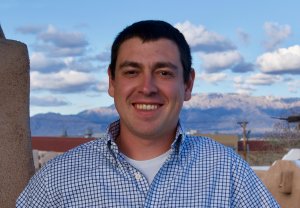Presented By: Aerospace Engineering
Chair's Distinguished Lecture: Multifidelity Approaches for Uncertainty Quantification

Alex Gorodetsky
Assistant Professor
Department of Aerospace Engineering
University of Michigan
Abstract:
Digital design and simulation tools have rapidly expanded to encompass a vast array of applications across science and engineering. Decision making approaches and engineering and scientific predictions increasingly relying on simulation models that exhibit enormous amounts of uncertainty. Whether you are predicting the drag on an aircraft or the spread of covid-19 -- the models that underpin predictions must begin to honestly consider model parameter uncertainty, environmental uncertainty, and input uncertainties to yield robust and reliable predictions. Uncertainty quantification (UQ) provides a paradigm for all aspects of managing this uncertainty in simulation models, including: forward uncertainty propagation, inverse problems, and experimental design. Nevertheless uncertainty quantification is expensive, requiring the evaluation of high-fidelity simulation models more times than is typically affordable. Reduced order models and surrogate models help to an extent -- but they can deviate from their high-fidelity counterparts in ways that introduce unacceptable bias.
Multifidelity approaches to UQ offer a promising alternative to minimize computational cost while maintaining the accuracy of a UQ analysis. In this talk we provide an overview of both sampling and surrogate-based multifidelity approaches. We dive into one specific approach for each one that offers significant promise of generality and that encompasses existing approaches. In the sampling context, we provide an overview of approximate control variates -- which enhance Monte Carlo methods for estimating statistics by treating lower-fidelity models as a correlated information source. In the surrogate context, we discuss MFNets: an approach to model the interactions between multifidelity information sources via a directed acyclic graph that is amenable to large-scale fast gradient-based learning. Throughout the presentation we will present results on both synthetic examples as well as prototypical PDE-based models.
About the speaker...
Alex Gorodetsky is an Assistant Professor of Aerospace Engineering at the University of Michigan. His research interests include using applied mathematics and computational science to enhance scalable autonomous decision making under uncertainty. He is especially interested in controlling systems, like autonomous aircraft, that must act in complex environments that are often represented by expensive computational simulations. Toward this goal, he pursues research in wide-ranging areas including uncertainty quantification, statistical inference, machine learning, numerical analysis, function approximation, control, and optimization.
Prior to coming to the University of Michigan, Alex was the John von Neumann Postdoctoral Research Fellow at Sandia National Laboratories in Albuquerque, New Mexico. At Sandia, Alex worked in the Optimization and Uncertainty Quantification Group on algorithms for propagating uncertainty through physical systems described with computationally expensive simulations.
Alex completed his Ph.D. (2016) and S.M. (2012) in the Department of Aeronautics and Astronautics at the Massachusetts Institute of Technology, where he worked on algorithms for stochastic optimal control and estimation in dynamical systems. He received his B.S.E (2010) in Aerospace Engineering from the University of Michigan.
Assistant Professor
Department of Aerospace Engineering
University of Michigan
Abstract:
Digital design and simulation tools have rapidly expanded to encompass a vast array of applications across science and engineering. Decision making approaches and engineering and scientific predictions increasingly relying on simulation models that exhibit enormous amounts of uncertainty. Whether you are predicting the drag on an aircraft or the spread of covid-19 -- the models that underpin predictions must begin to honestly consider model parameter uncertainty, environmental uncertainty, and input uncertainties to yield robust and reliable predictions. Uncertainty quantification (UQ) provides a paradigm for all aspects of managing this uncertainty in simulation models, including: forward uncertainty propagation, inverse problems, and experimental design. Nevertheless uncertainty quantification is expensive, requiring the evaluation of high-fidelity simulation models more times than is typically affordable. Reduced order models and surrogate models help to an extent -- but they can deviate from their high-fidelity counterparts in ways that introduce unacceptable bias.
Multifidelity approaches to UQ offer a promising alternative to minimize computational cost while maintaining the accuracy of a UQ analysis. In this talk we provide an overview of both sampling and surrogate-based multifidelity approaches. We dive into one specific approach for each one that offers significant promise of generality and that encompasses existing approaches. In the sampling context, we provide an overview of approximate control variates -- which enhance Monte Carlo methods for estimating statistics by treating lower-fidelity models as a correlated information source. In the surrogate context, we discuss MFNets: an approach to model the interactions between multifidelity information sources via a directed acyclic graph that is amenable to large-scale fast gradient-based learning. Throughout the presentation we will present results on both synthetic examples as well as prototypical PDE-based models.
About the speaker...
Alex Gorodetsky is an Assistant Professor of Aerospace Engineering at the University of Michigan. His research interests include using applied mathematics and computational science to enhance scalable autonomous decision making under uncertainty. He is especially interested in controlling systems, like autonomous aircraft, that must act in complex environments that are often represented by expensive computational simulations. Toward this goal, he pursues research in wide-ranging areas including uncertainty quantification, statistical inference, machine learning, numerical analysis, function approximation, control, and optimization.
Prior to coming to the University of Michigan, Alex was the John von Neumann Postdoctoral Research Fellow at Sandia National Laboratories in Albuquerque, New Mexico. At Sandia, Alex worked in the Optimization and Uncertainty Quantification Group on algorithms for propagating uncertainty through physical systems described with computationally expensive simulations.
Alex completed his Ph.D. (2016) and S.M. (2012) in the Department of Aeronautics and Astronautics at the Massachusetts Institute of Technology, where he worked on algorithms for stochastic optimal control and estimation in dynamical systems. He received his B.S.E (2010) in Aerospace Engineering from the University of Michigan.